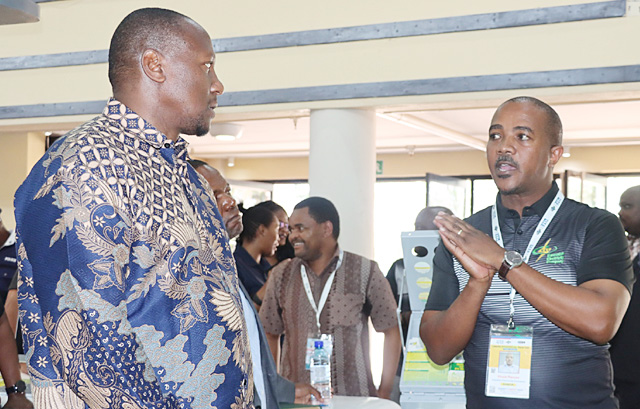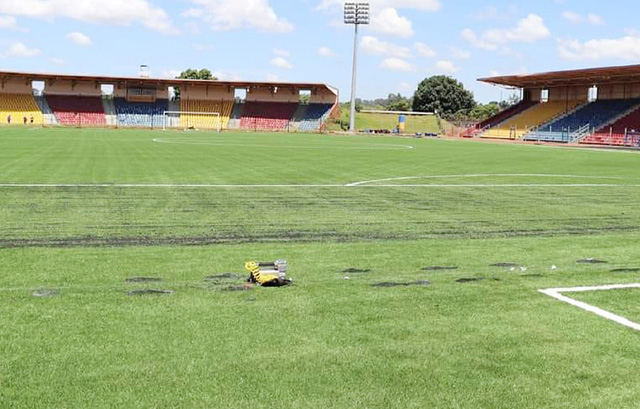By Nercha | 2025-03-31
HIV and AIDS have been prominent in Eswatini health discussions for decades, but the connection with kidney disease is not as well-known.
However, it's an essential part of understanding the broader impact of these conditions. As we wrap up the month of March, which happens to be Kidney Month, a time dedicated to raising awareness about kidney health and the prevention of kidney disease.
Kidney disease becomes a significant concern when we talk about co-infections, e.g., Hepatitis C and Malaria, and the side effects of long-term antiretroviral therapy. In Eswatini, regular monitoring of kidney function before starting ART and while taking ART ensures that patients are protected from kidney disease.
Kidney disease refers to a condition where the kidneys are damaged and unable to filter waste and excess fluids from the blood, effectively. This can lead to a build-up of toxins in the body, causing various health issues, including chronic kidney disease. If untreated, HIV can lead to AIDS (acquired immunodeficiency syndrome). While immense strides have been made in treating these conditions, complications like kidney disease are prevalent.
As the World Health Organisation and UNAIDS continue to report a significant number of people living with HIV and AIDS globally, including in Eswatini, the hidden prevalence of kidney issues among this population demands attention. People living with HIV are at a higher risk for kidney problems, partly because the virus and certain medications can affect kidney function.
HIV, the virus that causes AIDS, can directly and indirectly affect kidney health. One of the most notable conditions is HIV-associated nephropathy (HIVAN), a type of kidney disease that can lead to kidney failure if untreated. HIVAN is believed to be more common in individuals of African descent, highlighting the intersection of genetics and health disparities.
Also, the life-extending antiretroviral therapies (ART) that have changed the landscape of HIV treatment may play a dual role.
While they effectively suppress the virus and people are now living longer with HIV, certain ART medications can pose a risk to kidney function.
This is why people on ART need to check their kidney function periodically, as advised by their healthcare worker. Patients, therefore, face a delicate balancing act between controlling the virus and maintaining kidney health.
At the heart of prevention is early detection. Timely diagnosis of kidney disease within the HIV-positive population is crucial. It requires routine screenings, including urine tests and assessments of kidney function.
Early detection allows for interventions that can prevent progression, such as adjusting ART regimens or implementing dietary modifications. Encouraging individuals to engage in consistent medical follow-ups is paramount, as is making these diagnostic services widely accessible.
Diet and lifestyle modifications present another frontline defence against the development of kidney disease in those with HIV. A balanced diet low in sodium and processed sugars, combined with adequate hydration, supports kidney health. Additionally, avoiding smoking and limiting alcohol intake further reduces the risk of kidney complications.
These strategies, while beneficial to the general population, hold particular importance for those managing HIV. This is particularly important in people with HIV who also have diabetes or hypertension, as these conditions have a negative impact on the kidneys, leading in the long run to kidney disease.
Education remains a powerful tool in the prevention toolkit. Public health campaigns targeting HIV-positive communities with information about kidney disease risks and preventive strategies can empower individuals. By fostering an understanding of the symptoms, such as changes in urination patterns, unexplained swelling, or fatigue, people can be more proactive in seeking medical advice when warning signs first appear. For older men, screening for diseases of the prostate is also vital.
Healthcare providers play a pivotal role in this context. They need to be vigilant, recognising potential symptoms like swelling, fatigue, or changes in urine colour or volume and linking these symptoms to possible kidney issues. A proactive approach can lead to early interventions result in a better quality of life for those affected. Medications, too, play a pivotal role. For individuals undergoing ART, it is critical to work closely with healthcare providers to select drug regimens that minimise damage to the kidneys.
As treatment plans are personalised, regular reviews and adjustments can prevent adverse effects, ultimately safeguarding kidney health without compromising the effectiveness of HIV treatment.
Collaboration between nephrologists (kidney specialists), specialists, medical doctors, and primary care providers, nurses is essential. By sharing knowledge and strategies, these professionals can craft individualised care plans that address both HIV management and kidney health, enhancing the overall well-being of their patients.
In recent times, we have seen an increase in the number of people in the country attending dialysis sessions in the country’s health facilities due to kidney disease. Dialysis, while vital for kidney failure, presents unique challenges and considerations for individuals with HIV, requiring careful management of both HIV and kidney disease, including potential drug interactions and dose adjustments. Careful management, personalised medication plans and comprehensive healthcare can help mitigate many of the negative effects, ensuring that patients achieve optimal treatment outcomes for both conditions.
The narrative of HIV and AIDS is indeed one of remarkable resilience and advancing science. However, as we navigate its continued challenges, recognising and addressing the intertwined issue of kidney disease will be crucial.
By shining a spotlight on this often-hidden connection, we can pave the way for a more holistic approach to care - ensuring that individuals not only survive but thrive amid the complexities of living with HIV and AIDS.
The confluence of kidney disease and HIV presents a formidable challenge, but one that is not insurmountable with concerted efforts. Through prevention, regular monitoring, lifestyle modifications, and a united healthcare front, we can shield patients from the debilitating effects of co-infection. As medical research continues to evolve, our collective fight against HIV and associated conditions like kidney disease must remain relentless, innovative and inclusive.
By doing so, we ensure not only longevity but also a quality of life for those at the intersection of these health issues.
share story
Post Your Comments Below

GET ready to groove this weekend at the House Musiq Festival (HMF)!
Join in on the party as...

SEVERAL government ministries experienced a three-day power outage after the Eswatini Electricity...
MINISTER of Finance Neal Rijkenberg has addressed claims suggesting that he remains a sha...

SOMHLOLO National Stadium is set to take centre stage once again, with the Confederation of Afric...
All material © Swazi Observer. Material may not be published or reproduced in any form without prior written permission.
Design by Real Image Internet